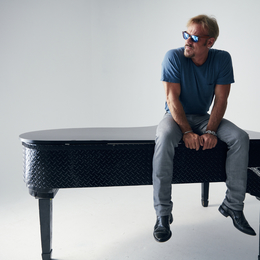
A common thread connects some of country music’s biggest icons—Alan Jackson, Mindy McCready, Jo Dee Messina, Tim McGraw, Collin Raye, etc.: Each possesses the bragging rights to a hit song penned by a gentleman named Phil Vassar.
Vassar, who was named the American Society of Composers, Authors and Publishers’ Country Songwriter of the Year in 1999, has written songs for everyone from Kenny Chesney (“Boston”) to Kenny Rogers (“It’s a Beautiful Life”), with 10 No. 1 singles and more than two dozen Top 40 hits to his credit. A Virginian by birth, Vassar has since become a proud resident of Nashville, Tenn., home to some of the world’s most brilliant and prolific songwriters; he counts the legendary singer-songwriter John Prine among his neighbors.
Hardly a one-trick pony, Vassar has used his considerable talents to earn a recording contract of his own. He will bring his act to the Sellersville Theater in Bucks County for two shows on Sept. 18 in support of his upcoming album, “American Soul,” due out this fall.
“There’s a lot of good and bad in every genre … and I think ‘live’ is always the test,” he says. “A lot of stuff gets ‘fixed’ in the studio, so much that when you hear some people play live, you say, ‘Is that the same guy?’ With some guys, it’s all about the image—the hat or the truck or the flannel—so it’s a whole lot of fluff: all crackers and no meat.
“I’ve seen Elton John in a small room with a piano,” he continues. “I’ve seen guys like Jimmy Buffett and John Prine on a small stage with just them and their instrument, and they just blow your mind; they don’t need lasers and stuff blowing up and everything else. I try to be the same way with my shows.”
Vassar stepped away from the piano in his Nashville studio to share his thoughts about life on the road, what it’s like to “cover” his own songs, and why broken hearts and good country songs tend to go hand in hand.
You’ll be playing at the Sellersville Theater next month. Any good memories you can share from past trips to the Philadelphia area?
Some I can’t talk about. [Laughs.] I have so many friends there. It’s one of those cities that, when you get there, you want to hang out and see as much as you can when you’re not working. I like that I can take my kids there and see all that history—from Virginia, where I grew up, to D.C., on up to Philly and New York.
You’ve made a good living writing songs for other people. It’s what you signed up for, but I wonder if it’s difficult to see someone else enjoy the fruits of your labor.
When an artist like Alan Jackson says, “Hey, I want to cut your song,” it’s a big honor. And it does open doors for you. At the same time, I’ll be at a show doing a song Alan Jackson or someone else sings, and people will say, “I don’t understand why you’re doing those covers.” I just want to say, “Those aren’t covers; those songs are mine.” Writing those songs for other people gave me the opportunity to do my own thing, and I do appreciate it. It is an honor, because there are so many great songwriters in Nashville.
As you’ve gotten older, how has your approach to songwriting changed?
I’ve been a songwriter all my life, so I think it has changed compared to when I was growing up, because I have a different set of life problems now. I’m a connoisseur of different kinds of artists, and I always thought it was kind of cool to listen to an album and say, “He’s in love with someone” or “He had his heart broken”; you can almost tell what they’re going through because it comes out on the record.
For some people, this business is about a lifestyle or putting on a big event. I’m into the mystique of the artistry. That’s why I still buy albums. That’s why I still go to see AC/DC or Paul McCartney or whoever when they come around. I like to write about things I know about, not about quantum physics; it’s about my life or my kids, or my friends’ lives or my friends’ kids.
What’s one thing people might not expect about your life, or about the life of a musician?
I have friends who come on the road [with me]—buddies who are doctors, lawyers, cops—and I think what they come away with is, “This is tough.” We wake up on a bus in a different city where we went to bed. Your diet suffers. Your workouts suffer. You have to find some semblance of order on the road. It’s an exhausting thing, and it’s not as glamorous as people think. But it’s the life we chose, and I love it. I still love getting [to the venue] and setting up and waiting for the show to start.
Photograph by Robby Klein


